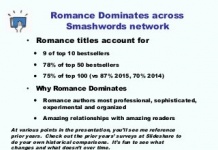 Charles Dickens didn’t invent serialized novels, but he’s certainly one of the best known authors to use the serial approach.
Charles Dickens didn’t invent serialized novels, but he’s certainly one of the best known authors to use the serial approach.
Whereas the traditional story has a beginning, a middle and an end, the serial novel is often characterized by the never-ending middle. The author starts the story, and then releases new installments over time.
I wonder what Charles Dickens would think of serialized ebooks. The topic is on my mind today because when I woke up this morning and looked at the Smashwords home page, it was dominated by five installments of a single ebook, each about 10,000 words.
The other day, I asked another author to stop posting his series of 2,000 word ebooks.
At Smashwords, we have a strict policy of only publishing complete, finished works. If you want to publish a partial book, or a work-in-process, we don’t want it, because it doesn’t fit with our mission of connecting a reader’s eyeballs and wallet to the finished works of our indie authors and publishers. If a customer purchases an unfinished, incomplete or partial work, they feel ripped off.
Yet we face a quandary with serialized books. They occupy a grey area. They technically don’t comply with our terms of service, unless each serialized chunk can stand alone as a complete story. But whose job is it to judge whether a story is complete or not, or long enough to qualify as a standalone work?
I created Smashwords to eliminate gatekeepers, not to become one. I don’t want to stand in the way of an author’s creative expression, or fail to serve a reader’s desire for serialized works.
So I wondered, are readers interested in serials? Am I wrong to discourage serials on Smashwords?
To gauge reader interest, I posted a short query over at Smashwords Site Updates, inviting Smashwords customers to share their opinions. Concurrent with that post, I posted an online poll at MobileRead, where I asked readers to share their opinions on serialized ebooks.
The early results surprised me. With only 36 votes recorded so far, 91% of respondents claim they either avoid reading serialized ebooks, or they never read them. It’ll be interesting to watch how the numbers shake out once the vote count approaches a more statistically significant sample size.
The comments at MobileRead are even more interesting. Many readers there are passionately opposed to serialized ebooks.
The initial results indicate I’m probably correct to continue discouraging serialized ebooks at Smashwords. We’re unlikely to outright ban them, because we don’t want to get into that gatekeeper role of determining what’s complete, and what’s not.
My hunch is that Darwin’s natural selection, powered by reader preferences, will prevent serialized ebooks from catching on. Most writers write to attract readers, not repel them.
Why do most readers hold serialized books in such disdain, as my unscientific poll appears to indicate? If I distill the essence of the initial MobileRead comments, as well as the private emails I’ve received today, it boils down to these four reasons:
Lack of immediate gratification – If you enjoy a book, you want to finish it now, not later.
Risk – You fear investing money in the serials, only to have the author abandon the project and leave the story unfinished.
Cost – A serialized book can be much more expensive than a complete book.
Inconvience – It’s easier and more convenient to download a single file than multiple files.
One Smashwords publisher, who asked to remain anonymous, emailed me this interesting idea:
If serialization of ebooks is permitted, it should only be after the author submits the entire book: then, and only then should the online publisher allow the chapters to be sold piecemeal… possibly on some standardized/automated periodical basis, like once a week.
If we were ever to embrace serialized books at Smashwords, I think his approach is equitable to all and makes sense. It would free us from gatekeeping and allow us to enable distribution and merchandising with a fully automated, author-opt-in technology solution. We like automation. However, given the apparent lack of interest in serialized ebooks, for the time being we have bigger fish to fry. And on that count, stay tuned. Cool stuff in the works.
Click here to cast your vote in my MobileRead serialization poll. The poll will close in two months.
Editor’s Note: the above is reprinted, with permission, from Mark Coker’s Smashwords blog. I never read, and never will read, serialized ebooks, myself. PB


































It’s a good question. A number of writers have found success using the serialized “Storyteller’s Bowl” method—most notably Sharon Lee and Steve Miller, whose books Fledgling and Saltation were serialized in draft form in return for reader donations.
On the other hand, other equally visible projects—such as Diane Duane’s The Big Meow or Scott Lynch’s Queen of the Iron Sands—have apparently fizzled.
Okay, so it’s not a “serial”, it’s just a series–a series of very short books at super low price.
So…what’s your answer to that, then?
Oh, and please please PLEASE PLEASE–oh wait, you already did draw conclusions from your badly-designed poll. Oh well. Is there a reason you didn’t include a “don’t care” option?
Serialized novels are like comic book mini-series. A fixed story told over x number of separate installments. OK, so far as it goes.
BUT, I remember a great DC series (Camelot 3000) when it came out (in the mid 1980’s.) The artist/writer, refused to turn in the last issue (which was delayed about a year) unless they got a big $ bonus. As a reader, I didn’t know anything about that, but experienced the long delay. Here, the author could publish the laST CHAPTER AT AN EXORBITANT PRICE!!
Bad idea- don’t allow it.
So I would guess that the smashwords people don’t like comic books, or television either. It’s funny I think most people that like serialized fiction don’t buy indie ebooks. Also methods of purchasing ebooks don’t lend themselves to the serialized format, you cant’ buy a “subscription” to the ebook serial, at least not yet. However like blogs, television, comic books, fanfiction, etc. I think that serialized e-fiction will come along. Just need some good writers who know the format.
Finally the poll on MobileRead is flawed unless you are trying lead people to say they don’t like serialized fiction. Personally I prefer it to other formats.
Indeed, Christian, I don’t like heavily serialized TV shows which are likely to get canceled after six episodes, leaving me hanging. I’ve taken to ignoring such until I’ve read they’ve been picked up for another season. I’ve read part of one serial novel at Smashwords. The first four or five chapters were presented free, then additional chapters were dribbled out at a rate of one every three or four months, at a dollar apiece, with no sign of when the story would conclude. I liked the story’s tone and setting, but I gave up on the work. Not knowing if it would ever finish, or what the total cost would be, it wasn’t worth spending the time or money on.
It sounds like there are different audiences for serialized and non-serialized fiction. I like the idea of doing it as a subscription but there needs to be some kind of guarantee that it will be completed.
Television, IMHO, is a bad example to use. The success of a new tv show is based on perceived audience size of the initial show or two ( assuming I understand correctly how that works.)
The issue here is whether an author will complete a story or not or if the publisher will still exist when it is complete. So that guarantee is important.
How?
So, only serialize something that is complete?
Thinking about it… Why does the author want to serialize a book in the first place?
Because they aren’t done with it yet? That defeats the reason behind the whole serializing only complete works method doesn’t it?
(Cross-posting from the Smashwords blog, my comment on this:)
I used a different method for serializing an unfinished work on Smashwords last Fall (yes, in violation of the TOS) – rather than putting up each chunk as a separate eBook, I just kept updating the 1 eBook (and its price) as I wrote & finished the book. People who clicked ‘buy’ in the first couple of chapters got it for free, and I ratcheted up the price with each add’l chapter until, when it was done, it was a normal eBook price. Readers who were willing to / interested in reading the book as a serialized, unfinished one were rewarded for taking that risk early with a lower price, and by having access to every version of the book I put out. (Smashwords automatically keeps every version of a book an author uploads, and gives readers access to every version put up from the time they buy it on.) With this model/idea, readers got the eBook they paid for, even if it hadn’t ever been finished, and authors have the opportunity to both involve their readers in the process of writing the book (like chunked livewriting) and to get financial incentive as they’re writing to finish the book.
The digital realm offers amazing options that have never been seen before, and saying indie authors aren’t allowed to play around with them is, I think, a mistake.
I’m also involved in the serialized electronic publishing of books in audio form, via podcasts, and it’s a popular, vibrant, diverse, and growing community of readers/listeners and authors/publishers. DailyLit is built around serialized eBooks, though they’re predicated on completed works, usually from public domain or large publishers. Both of those successful models for serialized electronic publication have incorporated a form of ‘push’ – I would love to have a way to easily notify my readers that there’s an updated version of one of my eBooks they’ve downloaded in the past, even without serialization, just for formatting and typographical corrections so that readers always have the best and most up-to-date version. A great tool for non-fiction, something that makes eBooks better than paper books, and which -if authors wanted to- could enable serialized eBooks to grow in popularity.
I am presently reading the Honor Harrington series by David Weber. Each book is in the range of 1.3MB. I don’t think I would want to tackle those as one great big book which would cover thousands of pages in print. Still, I look forward to each follow on book, just as I did with Lee Childs’ Jack Reacher series and Jean Auel’s Clan of the Cave Bear books. I hope you are not including these types of serials in your question of serial books. Perhaps it should be serialized book instead?
I really disagree with the majority opinion of this (admittedly) very small poll. (88 votes and counting.)
In the arena that counts, where people actually spend their money, the clear winner is in favor of ongoing, serailized storytelling.
Look at the success of ongoing series in all forms of media: book, TV, film…the comic book industry simply WOULD NOT EXIST without serialization.
I think eliminating serialized works would be setting a very bad precedent, not to mention being out of step with the history of publishing…and er, the history of mankind.
(After all, what are works like 1001 Arabian Nights, the Greek and Roman myths, the epic of Gilgamesh, etc. if not serialized, on-going series tales set in a common universe?)
Agree that there’s a very real risk that a serial novel will be an incomplete novel. As a publisher, I don’t bother with authors who have not completed their novel. Completing a novel is hard. In comparison, it’s easy to write a brilliant first couple of chapters.
Readers love series and sequels. That isn’t, I think, the same as a serialized novel of the type that used to appear in magazines. Considering the Honor Harrington example, each novel has a complete story arc, a resolution of the current issue, and a reasonable ending spot.
I fear that Smashwords or any other publisher would be hit with reader anger if they adopt the serial novel approach without a very real ability to assure themselves and the reader that the complete novel will be available on a timely basis and at a reasonable price.
Rob Preece
Publisher
Seems to me that this issue here is one of nerd backlash at modern methods of marketing SF&F genre fiction. That is, everything is “part of a series” rather than just being a bunch of books and occasional sequels.
If you want to complain about authors who introduce new characters instead of resolving plotlines, then you have a valid complaint, but that’s not a serialized novel problem, that’s an authorial problem.
I would refer you to a short discussion on this topic and starter suggestions on how an e-publisher should handle the genre. http://tinyurl.com/36r3pco
Books published in serial form have been common in Asia for a very long time. By the early years of this century, they were migrating to cellphones with authors delivering a chapter at a time. These became incredibly popular with Japanese commuters, who subscribed in droves. Print versions of the more popular books followed. Authors like Yoshi had print sales of 2 to 3 million copies of their cellphone books.
The same is happening in China, where the books are lunchtime reads. I would be surprised if we do not see some experiments in this format in North America.
I think the part of the problem with discussion is that too often things marketed as serialized fiction are in fact bad fiction. They are serialized not because that is the author’s preferred art form, but rather as a bad marketing decision or because the work is incomplete.
In good serialized fiction each part must be a complete. It may not be a complete story, but it must have a discrete arc with some form of emotional or plot conclusion at the end. Essentially it need to be worthwhile for the reader to purchase.
This is a good example of a serialized novel that’s already in print: http://lazarussmile.wordpress.com/
It also hooks up to a Fanpage on Facebook, plus an RSS feed, so followers are alerted to new posts. It also adds a new element with supplemental pics and occasionally videos.